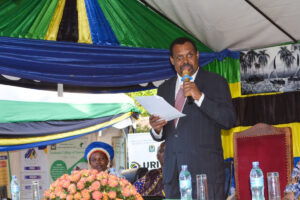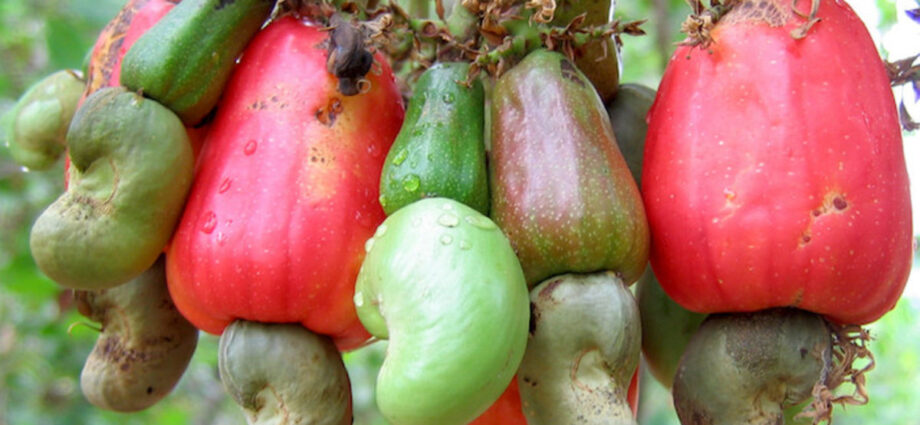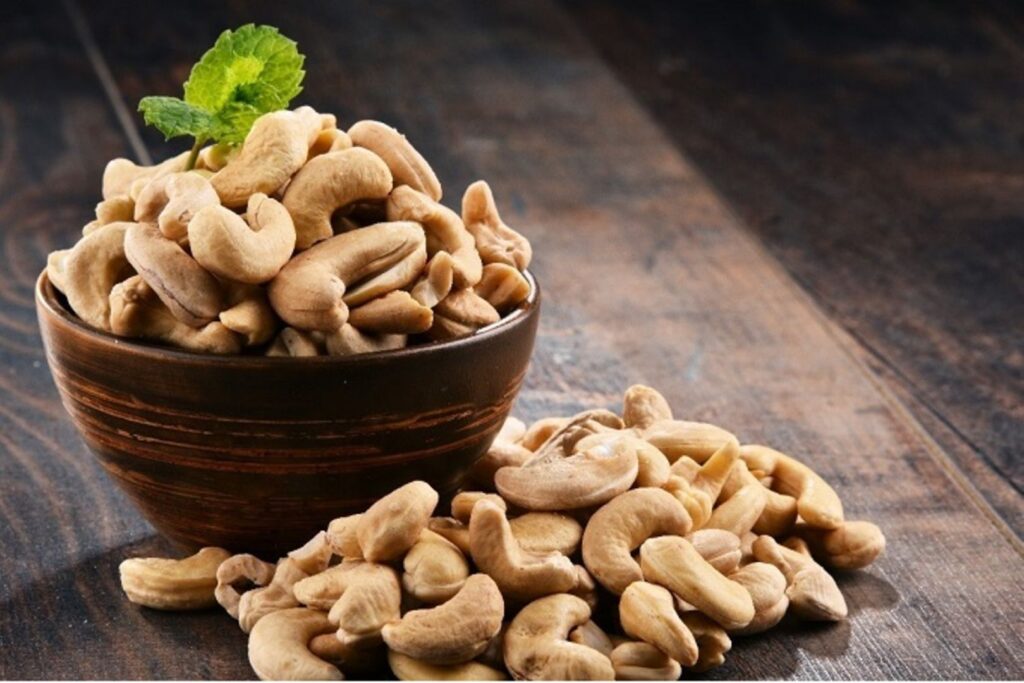The new cashew nut season opened in October, and a total of 89,658.73 tonnes have been sold so far.
In the ongoing 2022/23 season, the Cashew Nut Board of Tanzania (CBT) projects that 400,000 tonnes of raw cashew nuts (RCN) will be produced from different regions that grow the crop.
CBT’s acting director of marketing and quality assurance, Domina Mkangara, told The Citizen that the sales of the raw cashews were done by six farmer cooperatives during the last auctions.
So far, the board has conducted 26 auctions, but six of them did not get buyers.
The Agricultural Marketing Cooperative Societies, which participated in the auctions, include Tandahimba and Newala (Tanecu), Masasi and Mtwara (Mamcu), Ruangwa, Nachingwea, and Liwale (Runali), Tunduru (Tamcu), Lindi Mwambao, and the Coast Region Cooperative Union (Corecu).
“The farmers are free to sell their cashews without any pressure to do so, and that is our priority,” says Mkangara.
Out of the earned money, Sh26.027 billion was generated by members of Tanecu from 13,337.11 tonnes of raw cashews, according to Mkangara.
Members of Mamcu collected a total of Sh65.880 billion through the sale of 34,739.43 tonnes.
According to Mkangara, Mtwara Region fetched Sh91.907 billion from 48,076.54 tonnes, while Lindi Region earned Sh61.149 billion from 32,564.124 tonnes.
Runali sales revenue amounted to Sh41.771 billion from 21,569.47 tonnes while Lindi Mwambao generated Sh19.378 billion from 10,994.66 tonnes of raw cashew.
While Tamcu farmers generated Sh7.246 billion from 3,878.36 tonnes, their colleagues from Corecu have earned Sh9.533 billion through the sale of 5,139.71 tonnes, according to the cashew nut board official.
Acting director general of CBT, Francis Alfred, says at the beginning of the 2022/2023 season, low prices affected cashew nut sales, prompting farmers to reject the prices offered by buyers.
“I take this opportunity to assure farmers that they are free to decide whether to sell their cashews or not without interference from any person or entity,” he says.
Alfred says cashew production has increased around the world due to the increase of cashew nut farmers, with India and Vietnam remaining the main reliable markets.
He shares that African countries alone produce more than 2.3 million tonnes, up from 900,000 tonnes ten years ago.
“Worldwide, cashew production has increased from an average of 1.4 million tonnes in 2010 to 4.1 million tonnes in 2021. Africa contributes 56 percent of all cashews produced in the world,” he says.
According to the CBT official, cashew nut processing in various African countries remains less than 10 percent, while 90 percent of the raw cashews produced in the world are extracted in India and Vietnam.
“The harvest and sales season of cashews in Tanzania starts in October, along with Indonesia, Brazil, Mozambique, Kenya, and Zambia, which start immediately after the sale of cashews in West African countries, that produce a large number of raw cashews in Africa and the world,” says Alfred.
“The volatility in cashew prices is due to changes in demand, especially the consumption of cashew nuts (kernels) in the markets of India, China, Europe, and the United States, where the biggest consumers of this crop, which is considered the gold of the southern regions of Tanzania, are,” he adds.
The general manager of Runali, Jahida Hassan, says the biggest challenge in the new cashew harvest and sales season (2022/23) is the low price offered by buyers in the initial auctions.
“Low prices have caused farmers to boycott several auctions. We also anticipate a drop in production this season, hence we have little hope of reaching the sales recorded in the last season,” she said in a telephone interview.
Hassan said that by November 24, farmers in her cooperative had sold 20,000 tonnes.
“I advise farmers to send their produce to the cooperatives so they can finally enter the auctions before the rains start. Once it starts raining, the quality of cashews decreases,” she reasoned.
The general manager of the Lindi Mwambao Cooperative Association, Nurdin Swallah, says little knowledge of the local and global market state is the main reason farmers boycotted the prices during the early auctions.
“Farmers should know the state of the market in order to make the right decisions as well as benefit from the available markets,” says Swallah.
A cashew farmer in Tandahimba District, Halima Tamatama, advises farmers to accept the current prices saying they are influenced by the current situation in the world market.
She says farmers should send their produce to the market instead of leaving it to spoil at home.
“The little money we get, although it’s not enough compared to our expectations, will help to sustain our families and solve some of our challenges,” she notes.
Juma Hamisi, a farmer in Masasi District, says the prices of cashews are not good this season, which is why farmers rejected the prices in the previous auctions.
“I was supposed to use 200 bags of pesticides on my farm, sold for Sh60,000 per bag, but I only got 10 bags of subsidised inputs provided by the government, for which I did not pay any money,” he says.
Hamisi had to buy the remaining amount using his own money and wonders why farmers have no voice when it comes to selling their cashews. They are neither free to set their own price nor find their own buyers. This is not right, he says, calling for government’s intervention.
Hamisi says in order for agriculture to make a contribution to the economy, we need to change and work on the concept of agribusiness so that the farmer can benefit from the investment made.
Another farmer from Newala District, Shahara Mponda, says farmers in her area have sold cashews at the same price they did in 2012 and 2002, and that they expect to make some profit.
“We were hurt by the price of the last auction, but now I am thankful that we are selling our cashews at this price in this auction. We want the government to intervene so that we can get better prices,” Mponda says.
Karim Chipola, chairman of Tandahimba Newala Cooperative Union Limited (Tanecu), says the prices in the fourth auction held in Newala District increased slightly compared to the prices offered in the third auction.
“The prices are not satisfactory, but that is the situation in the world market. We have no choice but to sell our produce at the current prices. The board has told us that the prices are not the same in the world market and that if there was a problem, the board would be the first to deal with the situation,” he adds.
The Chairman of the Masasi (Mamcu), Silaj Mtenguka, says the growers agreed to sell their cashews at the highest price of Sh2,200 and the lowest price of Sh1,800 after they boycotted the previous auctions.
He says at the auction held at Kamundi Primary Cooperative Union, it’s the racketeers who made the farmers reject the price.
“The world market aside, farmers need to make their own decisions on pricing, they should not be forced by anyone,” says Mtenguka.
Share this news
This Year’s Most Read News Stories

Zanzibar Airports Authority enforces Dnata monopoly
. Airlines that have not joined the Zanzibar Airports Authority’s (ZAA) preferred ground handler, Dnata, at the Abeid Amani Karume International Airport (AAKIA) face eviction from the Terminal Three building Dnata is the sole ground handler authorised to provide services for flights that operate at Terminal 3.Continue Reading

Tanzania Declares Marburg Outbreak – Africa CDC Mobilizes Immediate Response

Addis Ababa, January 20, 2025</Strong> — Tanzania has declared a Marburg virus disease (MVD) outbreak after confirming one case and identifying 25 suspected cases in the Kagera Region of Northwestern Tanzania. The Marburg virus, a highly infectious and often fatal disease, is similar to Ebola and is transmitted to humans from fruit bats and monkeys. This outbreak marks the nation’s second encounter with the deadly virus, following the outbreak in Bukoba District of Kagera Region in March 2023, which resulted in nine cases and six deaths.
In response to this urgent threat, the Africa CDC is mobilizing strong support to help Tanzania contain the outbreak. A team of twelve public health experts will be deployed as part of an advance mission in the next 24 hours. The multidisciplinary team includes epidemiologists, risk communication, infection prevention and control (IPC), and laboratory experts to provide on-ground support for surveillance, IPC, diagnostics, and community engagement.
The Director-General of Africa CDC, Dr. Jean Kaseya, has engaged with Tanzania’s President Samia Suluhu Hassan and the Minister of Health to ensure coordinated efforts and secure political commitment for the response.
“Africa CDC stands firmly with Tanzania in this critical moment. To support the government’s efforts, we are committing US$ 2 million to bolster immediate response measures, including deploying public health experts, strengthening diagnostics, and enhancing case management. Building on Tanzania’s commendable response during the 2023 outbreak, we are confident that swift and decisive action, combined with our support and those of other partners, will bring this outbreak under control,” Dr. Kaseya stated.
Africa CDC has recently supported efforts to enhance the diagnostic and sequencing capacity of public health laboratories in Tanzania. PCR Test kits and genomic sequencing reagents have been dispatched, with additional supplies in the pipeline. To ensure rapid identification and confirmation of cases, the institution will also provide technical assistance to strengthen detection and genome sequencing for better characterization of the pathogen. Additionally, support will be provided to improve case management protocols and enhance the capacity to deliver safe and effective treatment.
Africa CDC is committed to working closely with the Government of Tanzania, regional partners, international organizations, and global stakeholders, including the World Health Organization, to stop the spread of the Marburg virus.
Source: allafrica.com

Karume faults lease of Zanzibar Islets
Diplomat Ali Karume has faulted the decision by the revolutionary government of Zanzibar to lease the islets that surround the islands of Unguja and Pemba to private developers saying it was absolutely not in Zanzibar’s national interests.Continue Reading












